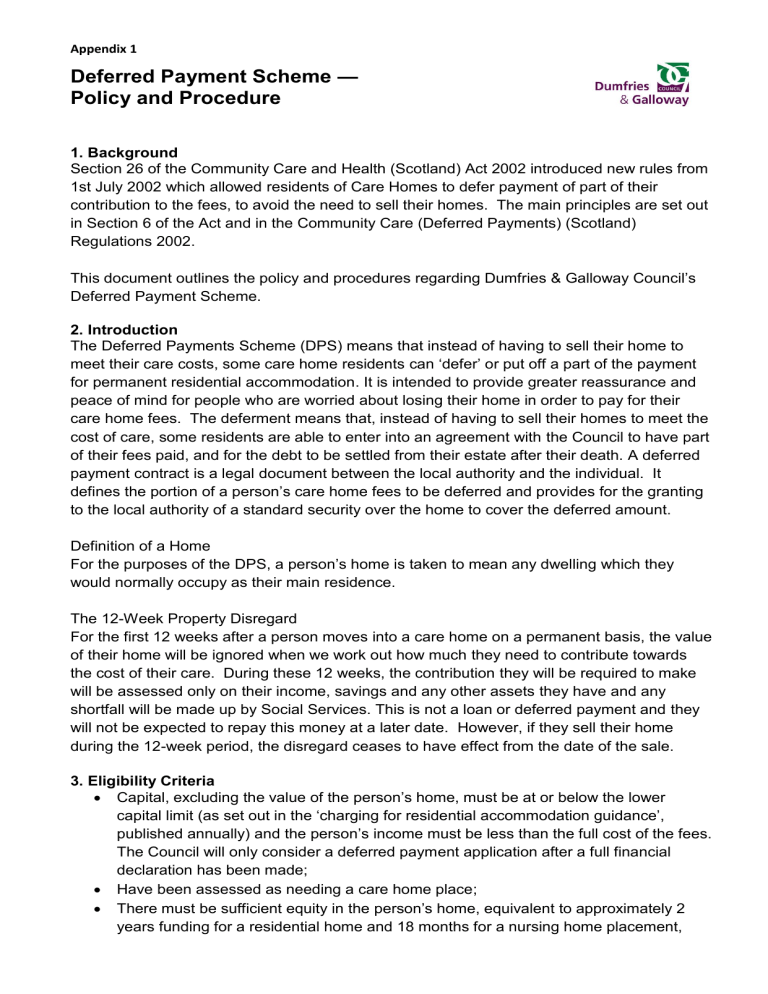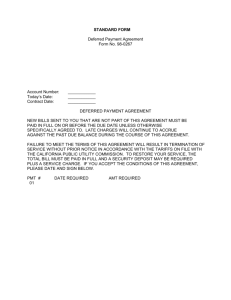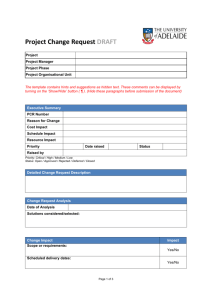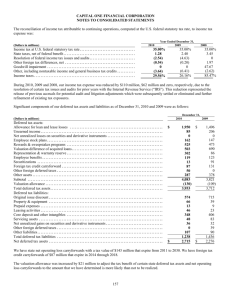Report-Final-Deferred Payment Scheme-Appendix 1

Appendix 1
Deferred Payment Scheme —
Policy and Procedure
1. Background
Section 26 of the Community Care and Health (Scotland) Act 2002 introduced new rules from
1st July 2002 which allowed residents of Care Homes to defer payment of part of their contribution to the fees, to avoid the need to sell their homes. The main principles are set out in Section 6 of the Act and in the Community Care (Deferred Payments) (Scotland)
Regulations 2002.
This document outlines the policy and procedures regarding Dumfries & Galloway Council’s
Deferred Payment Scheme.
2. Introduction
The Deferred Payments Scheme (DPS) means that instead of having to sell their home to meet their care costs, some care home residents can ‘defer’ or put off a part of the payment for permanent residential accommodation. It is intended to provide greater reassurance and peace of mind for people who are worried about losing their home in order to pay for their care home fees. The deferment means that, instead of having to sell their homes to meet the cost of care, some residents are able to enter into an agreement with the Council to have part of their fees paid, and for the debt to be settled from their estate after their death. A deferred payment contract is a legal document between the local authority and the individual. It defines the portion of a person’s care home fees to be deferred and provides for the granting to the local authority of a standard security over the home to cover the deferred amount.
Definition of a Home
For the purposes of the DPS
, a person’s home is taken to mean any dwelling which they would normally occupy as their main residence.
The 12-Week Property Disregard
For the first 12 weeks after a person moves into a care home on a permanent basis, the value of their home will be ignored when we work out how much they need to contribute towards the cost of their care. During these 12 weeks, the contribution they will be required to make will be assessed only on their income, savings and any other assets they have and any shortfall will be made up by Social Services. This is not a loan or deferred payment and they will not be expected to repay this money at a later date. However, if they sell their home during the 12-week period, the disregard ceases to have effect from the date of the sale.
3. Eligibility Criteria
Capital, excluding the value of the person’s home, must be at or below the lower capital limit (as set out in the ‘charging for residential accommodation guidance’, published annually) and the person’s income must be less than the full cost of the fees.
The Council will only consider a deferred payment application after a full financial declaration has been made;
Have been assessed as needing a care home place;
There must be sufficient equity in the person’s home, equivalent to approximately 2 years funding for a residential home and 18 months for a nursing home placement,
Appendix 1 allowing for increases in the fees. The Council will take 90% of the equity in the property into account when assessing eligibility;
Can grant the authority a standard security against their home, to secure a reasonable estimate of the total amount which will be owed i.e. the total of any deferred payments;
If the care home rate chosen is in excess of rates agreed by the Council and local care homes, then the Council reserves the right not to agree to a deferred payment;
If the property is jointly owned, the Council will need to see the title confirming joint ownership before the deferred payment can be considered. Agreement from the joint owner must also be sought;
The property must have insurance in place and proof must be provided.
4. Information for Service Users
Local authorities are required to ensure that people considering entering a care home are made aware of the DPS.
People wishing to take advantage of the DPS will be advised at application stage to seek independent financial advice.
The service user will be expected to maintain the property, e.g. contents and building insurance; heating to prevent frost and damp.
The Council charge a fee for setting up a deferred payment contract to cover professional fees and outlays. The actual cost will vary dependent on the complexity of the work involved in setting up the individual contract. These costs can be paid upfront or added to the debt to be recovered when the property is sold.
The service user may also incur some costs in obtaining independent advice or in obtaining documents necessary to set up the deferred payment. These costs will not form part of the deferred payment contract.
If the applicant has an outstanding mortgage on his/her property, a deferred payment will only be considered if the applicant can continue to make these mortgage payments while at the same time making their assessed contribution to care costs from their income.
5. Options where a Service User has a Property
Deciding to sell and access the DPS meantime
If the service user meets the eligibility criteria in Section 3 above, refer to Section 7. At this stage of the process a valuation of the property will be obtained by the Council. The debt will become due when entry is granted to the new owner.
Deciding not to sell and access the DPS
If the service user meets the eligibility criteria in section 3 above, refer to Section 7. At this stage of the process a valuation of the property will be obtained by the Council. If the service user dies without selling the property, the debt becomes due after 56 days or on sale of the property, whichever comes sooner.
Deciding not to sell and not to access the DPS
If the service user does not want to sell, but chooses not to take advantage of the scheme, they will need to advise the Council how they intend to meet their assessed charges. If a
Appendix 1 service use r refuses to pay their charges, their case will be referred to the Council’s central debt team for consideration of recovery methods.
Explaining Standard Securities
A standard security is used when someone other than the registered owner has a financial interest in the property. The most common form is a mortgage. The standard security prevents the property being sold without that financial interest being repaid. In each case where the Council agrees access to the DPS, a standard security on the property will be required as security for the period of the interest free loan.
Responsibility for preparing and registering a standard security will be as stated in section 7.
6. Valuation of Property
There are a number of ways of establishing the approximate value of a property:
From an Estate Agent if it has been put on the market
Ask the service user or their family for an approximate value
The local authority’s own Valuation Team
Local knowledge of property values
Property websites
The Council will ensure that an appropriate valuation is obtained. In the event that this valuation is challenged, it will be the responsibility of the service user or their representative to obtain the current valuation.
The Council will be responsible for writing to the service user or their representative confirming the value that is being taken into account in their financial assessment.
7. Legal Steps to be Taken
The Council will provide to its Legal Services Department details of the full address of the property, the full name of the Owner(s), valuation details and who is dealing with the service user’s affairs.
Legal Services will then carry out land register search confirming the owner of the property.
Subject to the satisfactory outcome of the ownership search, the Council will instruct Legal
Services to prepare the deferred payment contract and standard security and supply any outstanding information, including the date when the deferred payment contract should commence once the standard security has been registered.
Legal Services will notify the service user or their representative once the standard security has been registered.
The service user will be notified of their assessed contribution and the weekly rate that the debt will grow at (the deferred amount) and any other costs that will be added to the eventual total.
The service user will be notified by the Council on an annual basis detailing the outstanding debt.
Appendix 1
It is the responsibility of the service user or their representative (as a Party to the deferred payment scheme) to ensure that they fully understand the terms of the contract which they are entering into.
8. Charges for Additional Services
Some care homes make additional charges for superior rooms or other services that they offer. These additional service charges can be made in one of two ways. The service user can use other capital resources, e.g. savings in a building society and pay the additional service charges directly.
Alternatively it can be added to the deferred payment contract and the Council will recover this amount along with the Council’s cost of placement.
9. Letting the Property
The circumstances in which this might be considered are, if the service user does not want the property sold during their lifetime and the property would otherwise be empty. The net rental income which is generated (along with any other income) must be declared to the
Council in order to reduce the accruing debt.
The service user or their representative must ensure they are registered landlords before letting the property out.
10. Administration
The Council will be responsible for recording DPS standard securities and the amount of debt covered by the charges on a monthly basis.
The service user or their representative will be informed at annual intervals of the current level of the outstanding debt, reminded of the rate at which it is growing and given an estimate of the length of time their remaining assets will be sufficient to fund the full cost of their care.
When the remaining equity value plus actual capital reduces to the upper capital limit for selffunding, a re-assessment of the service user
’s contribution will be carried out under the published ‘charging for residential accommodation guidance’. The service user or their representative will be informed of this revised contribution and be advised that this charge must be settled on an ongoing basis.
The Council will support the service user or their representative to make the appropriate claims for Pension Credit if and when equity reduces and they become eligible for such benefits
11. Maintenance and Insurance of the Property
Increased Personal Needs Allowance
– the costs involved in maintaining the property, e.g. insurance and repairs must be met by the service user. This can be achieved by an increase in the personal needs allowance. In circumstances where the property needs to be maintained to avoid depreciation of the asset, it will be appropriate to make an allowance to cover basic costs of maintenance, including insurance of property. This additional allowance, if granted, will be included in the balance of the deferred payment contract to be settled at a later date.
Appendix 1
12. Sale of Property Before Death
If the service user has placed the property for sale on admission to long-term care, or chooses to sell at a subsequent date, the accrued debt will have to be repaid upon the sale in order to remove the standard security placed on the property.
The removal of the standard security will be arranged by Legal Services. The Council do not charge interest on the deferred payment until the contract is terminated. Once the contract has been terminated, the Council will charge interest at the rate of 8% if not paid immediately.
The service user may become self-funding depending on the balance of funds available after clearing the debt
13. Sale of Property After Death
Calculating the Debt
– The Council will be responsible for calculating the accrued debt.
Lodging a Claim – the Executor of the estate will be advised as soon as possible after the death is notified to Dumfries and Galloway Council, of the debt owing.
Notifying Final Debt – The Council will confirm the final debt in writing no later than 14 working days after the death has been notified to the Council.
Calculating the Interest – If the debt has not been settled within 56 days after death, the
Council will charge interest at 8 % after this period.
The free personal care and nursing care payments the Council make do not count as deferred payments and the service user will not be asked to pay this back.
14. Refusal of an Application to Deferred Payment Scheme
The Council can refuse a request for deferred payment. In such circumstances the decision will be notified in writing to the applicant, giving reasons for this decision. The applicant can ask for a review of the decision if they are not satisfied.
Grounds for refusal of an application to join the deferred payments scheme include, but are not limited to the following:
The Council has insufficient resources to enter into the contract based on its available budget for deferred payments;
The applicant does not meet the eligibility criteria to join the deferred payments scheme as set out in this policy;
The applicant or joint owners have not agreed to accepting the conditions of the deferred payment contract;
The property valuation indicates that there is insufficient equity for the Council to enter into a deferred payment contract;
The Council’s request to place a Standard Security the property has been refused by the Land Registry;
Appendix 1
The applicant fails to provide the Council with all relevant information relating to his/her finances and assets;
The applicant does not agree to pay or include the professional fees and outlays required in relation to the deferred payment contract.




